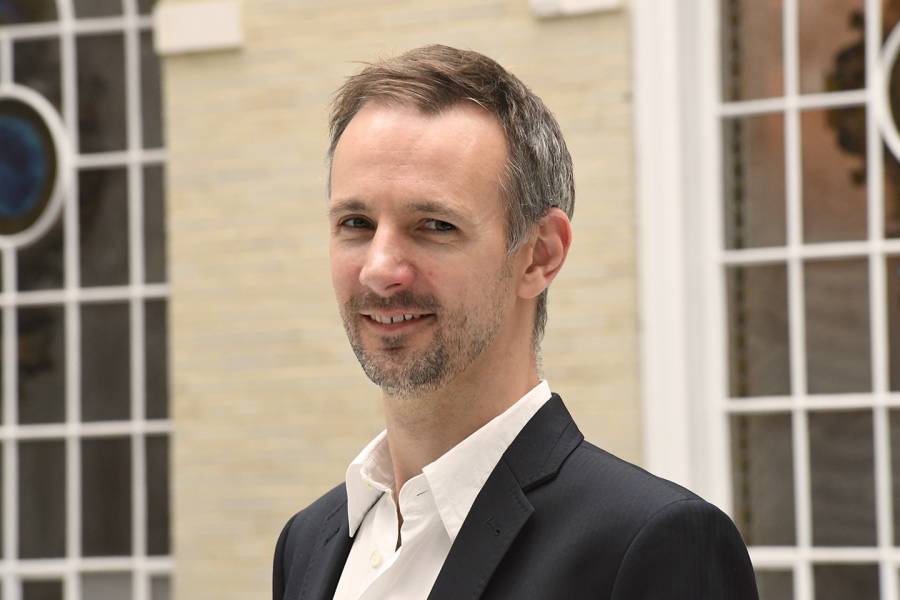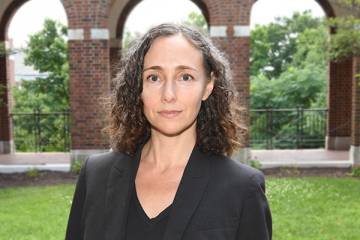Why is there anything at all? What makes us conscious? How do we determine consciousness in others?
These are the questions that consumed Ian Phillips as a child. In high school, his quest for answers led him down two different paths—first, he turned to physics for scientific explanations of the universe; then he studied poetry, looking for answers science couldn't provide.
As a student at Oxford, his pursuit evolved, transitioning away from physics and poetry to psychology and philosophy, the combination of disciplines he continues to study today. Though his methodology has changed over the years, his question remains the same: What makes a mind a mind?
Many of the great philosophers of the past were also pioneering scientists. During the 20th century both fields of study erected disciplinary boundaries attempting to sharply separate our philosophical and scientific questions and methods. However, recent decades have seen a renewed recognition of the need to combine forces to tackle some of the hardest questions about the mind.
"When I describe my focus, people think that I'm either just a philosopher who sits in an armchair and is completely out of touch with anything experimental, or someone who is working in the lab every day examining people's brains," Phillips said. "The truth is that I spend a lot of my time thinking through work in neuroscience and psychology, considering what precisely it shows, and how it connects and integrates with philosophical work. Is what I do philosophy or science? I don't see that as an either/or question."
Phillips joins Johns Hopkins University as a Bloomberg Distinguished Professor of philosophy and psychological and brain sciences in the Krieger School of Arts and Sciences, the 44th member of a cohort of scholars addressing some of the world's most important questions and problems and teaching the next generation. The program is backed by a $350 million gift from Michael R. Bloomberg, a Johns Hopkins alumnus, founder of Bloomberg LP and Bloomberg Philanthropies, World Health Organization Global Ambassador for Noncommunicable Diseases, UN Secretary-General's Special Envoy for Climate Action, and former New York City mayor.
Most recently, Phillips held the chair in philosophy of psychology at the University of Birmingham in the U.K., and has spent the last two years as a visiting research fellow in cognitive science at Princeton University. Previously, he was a professor of philosophy at Oxford University, and before that a lecturer at University College London.
"Phillips' ability to bridge science and philosophy is original, impactful, and important," says Beverly Wendland, dean of the Krieger School. "He has demonstrated an ability to ask important questions while proposing theories and hypotheses grounded in science."
In his research, Phillips explores the points at which the philosophy of mind and cognitive science intersect, using the strengths of each to inform his work in the other. Studying the relationship between the two, he examines questions of the nature of perception, the scientific study of consciousness, and temporal experience.
Questions Phillips is grappling with include:
- What is it to perceive something?
- What do perceptual illusions tell us about the nature of perception?
- Can we perceive more than we can report or remember?
- Is conscious experience inextricably linked with short-term memory?
- How must experience be structured for us to perceive change or motion?
- What explains why time seems to slow down during extreme events?
Phillips is currently working on a book analyzing the relationship between perception and consciousness. The book confronts the accepted wisdom of the existence of unconscious perception, tackling questions of consciousness in subjects where perception can be hard to measure or quantify, including in infants, animals, and people who have experienced brain damage.
"You might think that in order to find out whether someone is conscious of some object, all you have to do is ask them. But, when they say no, it can be shocking if they then smoothly reach out and grasp it despite continuing to insist they can't see it, as we find in certain patients with brain damage," Phillips said. "I'm really fascinated by what is going on in cases like these."
In addition to his teaching work, Phillips is editor of The Routledge Handbook of Philosophy of Temporal Experience. He has served as editor of the interdisciplinary academic journal Mind & Language and consulting editor of Timing & Time Perception. For several years he was also program chair of the European Society for Philosophy & Psychology. Phillips has been the recipient of numerous awards including a Philip Leverhulme Prize and the ASSC William James Prize for Contributions to the Scientific Study of Consciousness. A paper of his on afterimagery was selected as one of the top 10 papers of 2013 by The Philosopher's Annual.
"We are excited to have Ian Phillips join Johns Hopkins as one of our Bloomberg Distinguished Professors," said Sunil Kumar, the university's provost and senior vice president for academic affairs. "He is an impressive and exciting intellect, one of the best in the field of empirical philosophy."
Phillips' wife, Hanna Pickard, a leading applied philosopher in the fields of philosophy of psychiatry and moral psychology, will also join Johns Hopkins as a Bloomberg Distinguished Professor. Phillips said they are both eager to start their work and collaborate with colleagues on the Hopkins faculty.
"One of the things that's so exciting about coming to Hopkins," he says, "is all of the amazing people in philosophy, cognitive science, and psychological and brain sciences who are interested in trying to connect all of these pieces."
Posted in University News
Tagged philosophy, faculty, bloomberg distinguished professorships, ian phillips










